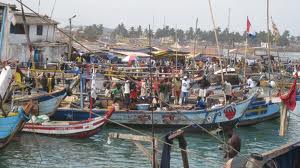Special topics
 Fisher folks in the coastal communities of the Western region have complained about the dwindling fish catch due to the negative impact of the oil and gas exploration and production.
Fisher folks in the coastal communities of the Western region have complained about the dwindling fish catch due to the negative impact of the oil and gas exploration and production.
The operations of the Jubilee Oil and Gas field, and fishing activities of surrounding communities in the Jomoro District is intertwined. The imposition of a ban on fishing within 500 metres radius of the Jubilee fields has affected the fishermen’s catch and income.
A SEND Ghana report on the extractive industry revealed that fishmongers in the Enosie Community in Half Asini, the capital of the Jomoro District have resorted to petty trading and farming for alternative livelihoods, while others do not have any other means of survival aside fish mongering.
Petty trading including the sale of iced water and groceries is becoming a popular alternative economic activity among fishmongers and processors in the area, a situation they attributed to the dwindling fish catch.
The report, “Our Money, Our Share, Our Say: The Extractive Industry in Perspective,” was to assess the extent to which transparency, accountability and equity exist in the use of public resources by the Tarkwa Municipal Assembly, the Jomoro and Tolon-Kumbugu District Assemblies.
It recommended that the Ministry of Fisheries and Aquaculture Development and the Fisheries Commission must come up with a clear policy to save the fishing industry from collapse and the consequential losses in livelihoods of fishing families in coastal communities in the Western region in the light of the oil and gas discovery.
Also, efficient investment in smallholder agriculture and direct support for alternative livelihood ventures will improve the incomes and livelihood security of the larger proportion of the population engaged in agricultural production including fishing.
The report said the impact of oil spill on marine life and livelihoods of the communities can be disastrous. Such potential threats to livelihoods justify adequate compensation to local assemblies to stimulate development in the locality.
Although mineral exploitation is a major source of income to both Tarkwa Nsuaem and Tolon-Kumbugu Assemblies, the environment and social cost far outweigh the benefits, such that citizens have not seen significant development accruing from the exploitation of minerals.
In Tolon-Kumbugu District Assembly, sand winning is posing a serious environmental challenge to the people. The activities have fast degraded farm lands and affected farmers can no more cultivate crops. Citizens indicated the unregulated sand winning in the Dalun area is affecting farming activities which is their main source of livelihoods.
In Tarkwa-Nsuaem, polluted water bodies have been associated with skin diseases and type 11 diabetes caused by intake of arsenic, a carcinogen associated with gold ores. A baseline study conducted showed that all the 117 rivers and streams in the Municipality were perceived to have been polluted by mining companies and small-scale mining operators (galamsey) (Obiri 2012).
In the Jomoro District, citizens are concerned that the oil rigs and the Floating Production Storage and Offloading (FPSO) vessel use very high lightening system which crowds most of the fishes around it leaving the fishable areas almost empty. The situation, the fishermen stated is the principal cause of their low harvest making fishing activity unattractive and unprofitable.
A fisherman at Half Asini said “the oil and gas companies have taken full control of the sea and they are destroying our fishing business, how can we survive with our children and wives with all these restrictions on fishing around the oil rig and FPSO”?
The study restricted itself to the use internally generated fund (IGF) with special emphasis on royalties that are generated from minerals, including oil and gas exploration and exploitation. Clearly, these communities have invariably suffered both negative environmental and socio-economic consequences from the activities of the extractive sectors in their localities.
The report therefore expects that the funds that accruing from the mining and drilling activities will inure to the benefit of the affected communities in a way that engender greater development results.
It stated the vehicle for translating these gains into on-the-ground-development benefits for the affected communities is a function of the assemblies’ ability to benefit from royalties and taxes paid by the exploration and exploitation companies.
Indeed, the report makes it clear that there are challenges with the existing laws guiding the distribution of royalties; a lack of harmony in the legal; framework for administering royalty distribution is ripping some assemblies of, yet the report established instances where communities suffer without any form of compensation.
Section 111 (1) of the Mining and Minerals Act defines mineral as a substance in liquid or solid form that occurs naturally in or on the earth, or on under the seabed, formed by or subject to geographical process including industrial mineral but does not include petroleum.
Although this and other laws on natural resources vest ownership of mineral resources in the state, sand winning like other small scale mining activities escape rigorous regulation from state institutions.
The SEND study recommended that the oil revenue must be managed in such a way that it benefits Ghanaians in general and the coastal communities along the western coast line of Ghana in particular because they are currently bearing all the negative environmental, social and economic effects of the oil exploitation including livelihoods losses.
For this to be achieved, it is recommended that the Petroleum Revenue Management Law be amended to make provisions for the payment of royalties to the coastal districts in the Western region. The proportion should be arrived at through consultation with all stakeholders.
Source: Daily Graphic